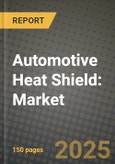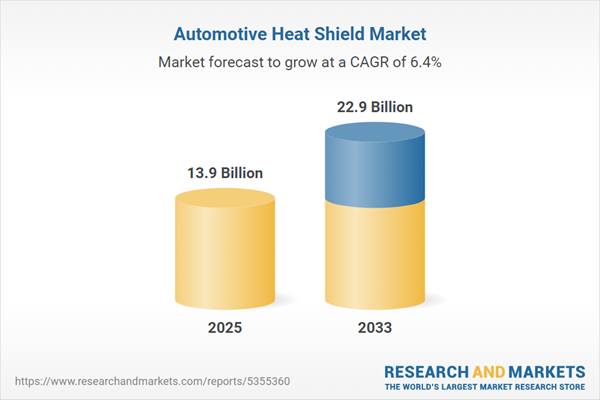The automotive heat shield market plays a critical role in protecting vehicle components and occupants from excessive heat generated by engines, exhaust systems, and other heat-producing elements. Heat shields are designed to deflect, absorb, or dissipate heat, ensuring that sensitive parts such as fuel tanks, electronic control units, and passenger compartments remain cool and operate safely. As vehicles become more compact and powertrains more efficient, the demand for advanced heat shield technologies continues to grow.
Recent innovations in materials and manufacturing processes have led to the development of lighter, more durable, and more effective heat shields. Composite materials, advanced coatings, and multi-layered designs are increasingly used to enhance thermal insulation and reduce weight, thereby improving fuel efficiency and emissions performance. These advancements have been especially important in meeting stringent regulatory requirements and consumer expectations for eco-friendly and high-performance vehicles.
Despite challenges such as fluctuating raw material costs and the complexity of integrating heat shields into evolving vehicle architectures, the market is well-positioned for growth. The continued focus on thermal management and the shift toward electrification are driving demand for heat shields tailored to hybrid and electric vehicles, ensuring the market’s relevance in a changing automotive landscape.
Key Insights: Automotive Heat Shield Market
- A significant trend in the automotive heat shield market is the use of lightweight and environmentally friendly materials. Advanced composites and aluminum-based shields reduce overall vehicle weight, improve fuel economy, and support sustainability goals. These materials also offer improved durability and resistance to high temperatures, making them ideal for modern vehicle applications.
- Another trend is the integration of multifunctional heat shields. Modern designs not only provide thermal protection but also offer noise reduction, vibration dampening, and aerodynamic benefits. This multifunctionality helps manufacturers meet multiple performance criteria with a single component, streamlining production and reducing costs.
- The increasing complexity and compactness of modern powertrains is a major driver of the automotive heat shield market. As engines become more powerful and efficient, they generate higher temperatures, requiring advanced thermal management solutions. Heat shields that can handle these higher thermal loads are essential to maintaining component reliability and vehicle safety.
- Another driver is the growth of hybrid and electric vehicles. These powertrains introduce new thermal challenges, such as battery cooling and inverter heat management. The need for innovative heat shields that protect sensitive electric components while maintaining overall thermal efficiency is driving demand in the market.
- One challenge in the automotive heat shield market is the cost of advanced materials. High-performance composites and coatings often come at a premium, increasing production costs and pricing pressures. Manufacturers must find ways to reduce costs without compromising quality or performance.
- Another challenge is the complexity of integrating heat shields into increasingly sophisticated vehicle architectures. Modern vehicles often feature multiple heat-generating systems located close together, requiring highly customized and precisely engineered heat shield solutions. This complexity demands significant R&D investment and engineering expertise to ensure optimal performance and compatibility with other vehicle systems.
Automotive Heat Shield Market Segmentation
By Material Type:
- Metallic
- Non-metallic
By Vehicle Type:
- Passenger Car
- Light Commercial Vehicle
- Heavy Commercial Vehicle
By Product Type:
- Single Shell
- Double Shell
- Sandwich
By Application:
- Exhaust System Heat Shield
- Turbocharger Heat Shield
- Under Bonnet Heat Shield
- Engine Compartment Heat Shield
- Under Chassis
By Sales Channel:
- OEM
- Aftermarket
By Geography:
- North America (USA, Canada, Mexico)
- Europe (Germany, UK, France, Spain, Italy, Rest of Europe)
- Asia-Pacific (China, India, Japan, Australia, Vietnam, Rest of APAC)
- The Middle East and Africa (Middle East, Africa)
- South and Central America (Brazil, Argentina, Rest of SCA)
Automotive Heat Shield Market Size Data, Trends, Growth Opportunities, and Restraining Factors:
- This comprehensive Automotive Heat Shield market report delivers updated market size estimates from 2024 to 2034, offering in-depth analysis of the latest Automotive Heat Shield market trends, short-term and long-term growth drivers, competitive landscape, and new business opportunities. The report presents growth forecasts across key Automotive Heat Shield types, applications, and major segments, alongside detailed insights into the current Automotive Heat Shield market scenario to support companies in formulating effective market strategies.
- The Automotive Heat Shield market outlook thoroughly examines the impact of ongoing supply chain disruptions and geopolitical issues worldwide. Factors such as trade tariffs, regulatory restrictions, production losses, and the emergence of alternatives or substitutes are carefully considered in the Automotive Heat Shield market size projections. Additionally, the analysis highlights the effects of inflation and correlates past economic downturns with current Automotive Heat Shield market trends, providing actionable intelligence for stakeholders to navigate the evolving Automotive Heat Shield business environment with precision.
Automotive Heat Shield Market Competition, Intelligence, Key Players, and Winning Strategies to 2034:
- The 2025 Automotive Heat Shield Market Research Report identifies winning strategies for companies to register increased sales and improve market share.
- Opinions from senior executives from leading companies in the Automotive Heat Shield market are imbibed thoroughly and the Automotive Heat Shield industry expert predictions on the economic downturn, technological advancements in the Automotive Heat Shield market, and customized strategies specific to a product and geography are mentioned.
- The Automotive Heat Shield market report is a source of comprehensive data and analysis of the industry, helping businesses to make informed decisions and stay ahead of the competition. The Automotive Heat Shield market study assists investors in analyzing On Automotive Heat Shield business prospects by region, key countries, and top companies' information to channel their investments.
- The report provides insights into consumer behavior and preferences, including their buying patterns, brand loyalty, and factors influencing their purchasing decisions. It also includes an analysis of the regulatory environment and its impact on the Automotive Heat Shield industry. Shifting consumer demand despite declining GDP and burgeoning interest rates to control surging inflation is well detailed.
What's Included in the Report?
- Global Automotive Heat Shield market size and growth projections, 2024-2034
- North America Automotive Heat Shield market size and growth forecasts, 2024-2034 (United States, Canada, Mexico)
- Europe market size and growth forecasts, 2024-2034 (Germany, France, United Kingdom, Italy, Spain)
- Asia-Pacific Automotive Heat Shield market size and growth forecasts, 2024-2034 (China, India, Japan, South Korea, Australia)
- Middle East Africa Automotive Heat Shield market size and growth estimate, 2024-2034 (Middle East, Africa)
- South and Central America Automotive Heat Shield market size and growth outlook, 2024-2034 (Brazil, Argentina, Chile)
- Automotive Heat Shield market size, share and CAGR of key products, applications, and other verticals, 2024-2034
- Short- and long-term Automotive Heat Shield market trends, drivers, challenges, and opportunities
- Automotive Heat Shield market insights, Porter’s Five Forces analysis
- Profiles of 5 leading companies in the industry - overview, key strategies, financials, product portfolio and SWOT analysis
- Latest market news and developments
Key Questions Answered in This Report:
- What is the current Automotive Heat Shield market size at global, regional, and country levels?
- What is the market penetration of different types, Applications, processes/technologies, and distribution/sales channels of the Automotive Heat Shield market?
- What will be the impact of economic slowdown/recission on Automotive Heat Shield demand/sales?
- How has the global Automotive Heat Shield market evolved in past years and what will be the future trajectory?
- What is the impact of growing inflation, Russia-Ukraine war on the Automotive Heat Shield market forecast?
- What are the Supply chain challenges for Automotive Heat Shield?
- What are the potential regional Automotive Heat Shield markets to invest in?
- What is the product evolution and high-performing products to focus in the Automotive Heat Shield market?
- What are the key driving factors and opportunities in the industry?
- Who are the key players in Automotive Heat Shield market and what is the degree of competition/Automotive Heat Shield market share?
- What is the market structure /Automotive Heat Shield Market competitive Intelligence?
Available Customizations:
The standard syndicate report is designed to serve the common interests of Automotive Heat Shield Market players across the value chain, and include selective data and analysis from entire research findings as per the scope and price of the publication.However, to precisely match the specific research requirements of individual clients, several customization options are offered to include the data and analysis of interest in the final deliverable.
Some of the customization requests are as mentioned below:
- Segmentation of choice - Clients can seek customization to modify/add a market division for types/applications/end-uses/processes of their choice.
- Automotive Heat Shield Pricing and Margins Across the Supply Chain, Automotive Heat Shield Price Analysis / International Trade Data / Import-Export Analysis.
- Supply Chain Analysis, Supply-Demand Gap Analysis, PESTLE Analysis, Macro-Economic Analysis, and other Automotive Heat Shield market analytics.
- Processing and manufacturing requirements, Patent Analysis, Technology Trends, and Product Innovations.
- Further, the client can seek customization to break down geographies as per their requirements for specific countries/country groups such as South East Asia, Central Asia, Emerging and Developing Asia, Western Europe, Eastern Europe, Benelux, Emerging and Developing Europe, Nordic countries, North Africa, Sub-Saharan Africa, Caribbean, The Middle East and North Africa (MENA), Gulf Cooperation Council (GCC) or any other.
- Capital Requirements, Income Projections, Profit Forecasts, and other parameters to prepare a detailed project report to present to Banks/Investment Agencies.
Additional support:
- All the data presented in tables and charts of the report is provided in a separate Excel document
- Print authentication allowed on purchase of online versions
- 10% free customization to include any specific data/analysis to match the requirement
- 7 days of analyst support
This product will be delivered within 1-3 business days.
Table of Contents
Table Information
| Report Attribute | Details |
|---|---|
| No. of Pages | 150 |
| Published | August 2025 |
| Forecast Period | 2025 - 2033 |
| Estimated Market Value ( USD | $ 13.9 Billion |
| Forecasted Market Value ( USD | $ 22.9 Billion |
| Compound Annual Growth Rate | 6.4% |
| Regions Covered | Global |









